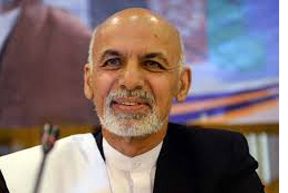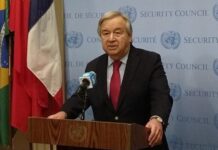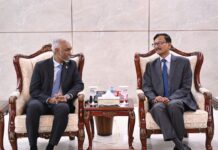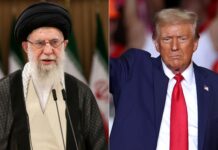 KABUL: Ashraf Ghani, a one-time US-based academic, was sworn in as new president of Afghanistan today and used his inaugural speech to call for Taliban insurgents to join peace talks after 13 years of war.
KABUL: Ashraf Ghani, a one-time US-based academic, was sworn in as new president of Afghanistan today and used his inaugural speech to call for Taliban insurgents to join peace talks after 13 years of war.
The ceremony at the presidential palace in Kabul marked the country’s first democratic transfer of power and opened a new era after the rule of Hamid Karzai, president since the Taliban regime was ousted in 2001.
The June presidential election was engulfed in disputes over fraud, but international donors welcomed today’s inauguration as a key legacy of the costly military and civilian intervention in Afghanistan.
NATO’s US-led combat mission will end in three months but the Taliban still pose a serious threat to national stability, having launched several fresh offensives in recent months.
“We ask opponents of the government, specially the Taliban and Hizb-e-Islami (another militant group), to enter political talks,” Ghani said after being sworn in.
“Any problems that they have, they should tell us, we will find a solution. We ask every villager to call for peace.
We ask Muslim scholars to advise the Taliban, and if they don’t listen to their advice, they should cut off any relations.”
Karzai also pursued peace talks with the Taliban, but preliminary efforts collapsed last year when a Taliban office that opened in Qatar was styled as an embassy for a government-in-exile.
The security threat in Kabul was underlined by a suicide attack near the airport today in which police said four civilians were killed. The Taliban claimed responsibility.
Afghan dignitaries gathered at the palace from early morning with helicopters buzzing overhead ferrying a guest-list of low-level foreign representatives.
John Podesta, counselor to President Barack Obama, led a 10-strong US delegation, with President Mamnoon Hussain representing Pakistan and Vice President Hamid Ansari traveling from India.
Many other countries, including Britain and France, were represented only by their diplomats in Kabul, while China sent Yin Weimin, minister of human resources.
Both Ghani and his poll rival Abdullah Abdullah claimed to have won the election, plunging Afghanistan into months of crisis that fuelled the insurgency and worsened the country’s dire economic outlook.
Under heavy pressure from the US and UN, the two candidates eventually agreed to form a “national unity government”, and Ghani was declared president a week ago after an audit of nearly eight million ballot papers.
Abdullah was sworn in today as “chief executive”, a new role similar to a prime minister, as part of a power-sharing deal that is likely to cause friction between opposing camps within the government. (AFP)
Abdullah struck a positive tone at the ceremony, saying that “in this critical period of history, as a team, we are committed to a national unity government based on the political deal”.
“I’m sure the new leadership has received the people’s message and will make peace and stability their priority,” Karzai said at the ceremony in his final appearance as president.
“There is no progress without peace. If there was peace in our country, and if there were no obstacles to it, our country would have advanced more.”
Karzai achieved patchy success in improving education, access to health and women’s rights but was often accused of failing to tackle rampant corruption and Taliban violence.
Both Ghani and Abdullah are moderate, pro-Western leaders who have vowed to push ahead with reforms at a difficult time as NATO troops leave and international aid falls.
Only 33 NATO bases are still active, down from a peak of 800 — leaving local security forces to battle the Taliban with less and less help.
Today’s inauguration opened the way for Ghani to sign an agreement allowing 12,500 US-led troops to remain into 2015 to support and train the national police and army.
Ghani had promised immediately to reverse Karzai’s decision not to sign the deal, and the document is due to be inked tomorrow.
Final results revealed Ghani beat Abdullah 55 to 45 percent in the run-off vote, though the UN said the election had been affected by “significant fraud”.
Karzai was constitutionally barred from running for a third term in office. –AFP






